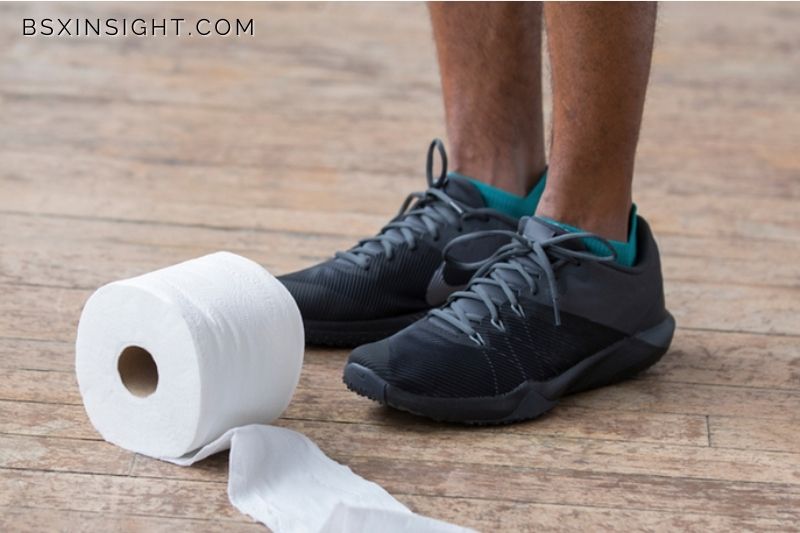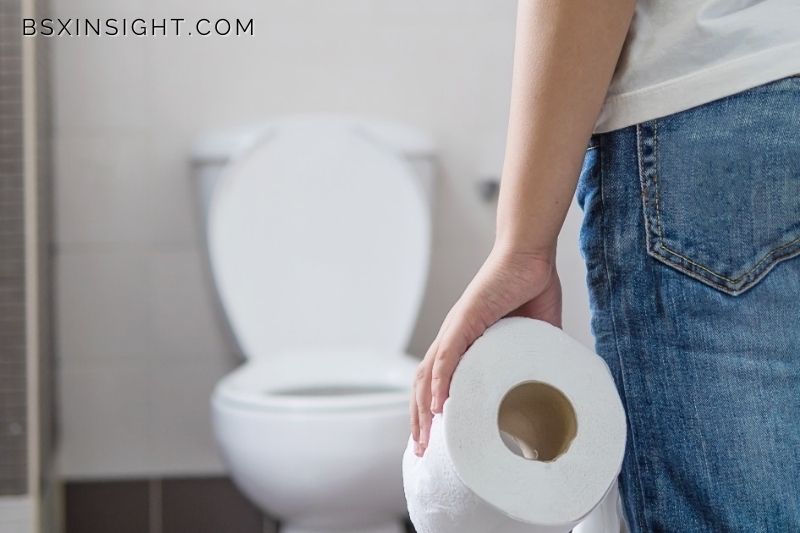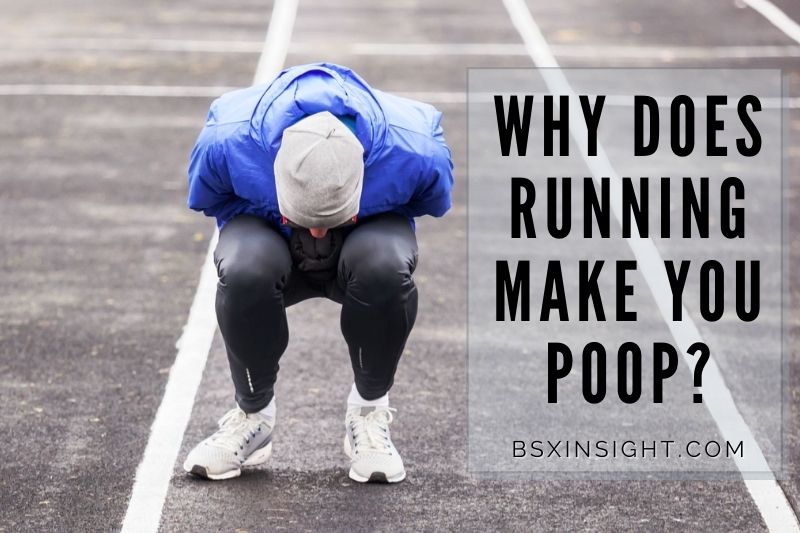- BSX Insight
Running is a great way to get in shape, but it can also have some unexpected side effects. One of these is that it can make you poop. This is because running can cause your bowels to move more quickly, and sometimes this can lead to an upset stomach or diarrhea. If you are planning to start running, be prepared for the possibility of having to poop afterward.
In this blog post, BSXInsight will explain why does running make you poop and how to avoid it? Let’s get started.
Everybody Poops
Runners of all types, from ultra-runners to recreational runners, have similar stomach problems. James Lee, M.D. of St. Joseph’s Hospital, Orange, California, says that up to 80 percent of runners experience GI disturbances, including abdominal pain and bowel dysfunction. Here’s how to poop correctly – and yes, there is a correct way.
Even worse, a 2009 study of risk factors for gastrointestinal (GI) symptoms during exercise found that young and female athletes were more likely than older athletes to experience lower GI issues such as cramps, flatulence, and side stitches.
Three Reasons Why Does Running Make You Poop

You’re All Shook Up
Running can send a thudding, pounding, up and down jolt through your body that can trigger the desire to urinate.
Buckingham explains, “With every foot strike, you shake your internal organs, speeding down the descent of poop.” It causes spasms or contractions in the colon and/or rectum which can increase your susceptibility to bowel movements.
This effect is more common in runners than in other athletes. Buckingham states that running is more painful than swimming or cycling.
Adrenaline is Coursing Through You
Your brain releases adrenaline (also known as epinephrine) when you exercise or think about exercising. Adrenaline can increase your heart rate and deliver more blood flow to your muscles, which allows you to perform at a higher level. It’s all great stuff, but it can also cause you to lose a deuce.
If you are running in an actual race, expect to have a higher level of adrenaline and a greater chance you’ll have to take a bathroom break than you would during your daily trot. Adrenaline, also known as “fight or flight”, surges under stress.
There is not a lot of scientific evidence to support the hypothesis that adrenaline causes defecation. However, there are some theories.
Buckingham states, “One theory suggests that prehistoric cavemen ran from saber-tooth Tigers. Adrenaline caused them to excrete so they could get away lighter.”
Your Digestive System Is Slow-Mo
Your blood flow is affected by exercise. Buckingham states that blood flow flows to the areas where oxygen is most important. “So if you’re running, more blood flows to your legs while your GI system receives less.
The rate at which your digestion is affected by this decreases compared to when it’s at rest. Although you might think slower digestion means less likelihood of defecating, it actually increases your chance of getting diarrhea. This is because your GI system doesn’t work as well.
Buckingham adds that exercise hormones cause more water or sports drinks to be released into your digestive system. This causes the bolus (the liquid from chewed food) to be larger, which can lead to loose stool.
Do you suffer from chest pain while running? Check out our post to get information: Chest Pain When Running: Causes And What To Do 2023
Do Running Cause Other Reactions?

Running is a form of exercise that can have many different effects on the body, including walking makes me poop.
While the exact mechanism is not fully understood, it is thought that running may stimulate nerve endings in the intestine, which can lead to increased bowel movements.
Additionally, running can also increase blood flow to the intestine, which may also contribute to bowel movements.
Finally, running may also increase the number of hormones like adrenaline and cortisol in the body, which can also lead to increased bowel movements.
Tips on How To Avoid Pooping When Running
Keep a Food Diary

One of the best ways to avoid pooping while running is to keep a food diary. This will help you to identify any foods that may trigger an urge to poop.
Common offenders include high-fiber foods, dairy, and spicy foods. If you notice that you always have to poop after eating certain foods, try avoiding those foods before a run.
Improve Your Running Form
According to the American College of Sports Medicine, it takes an average runner 1000+ strides to run a mile. Singh says that this is a lot of intestinal jostling. It literally shakes your guts.
A simple way to reduce the trauma your inner organs experience and improve your running economy is to minimize vertical oscillation. This refers to how your body bounces up/down with every stride. Lumo Run and Garmin Forerunner 630 both track vertical oscillations, which can be helpful for runners.
Imagine a ceiling one inch above your head during your next mid run. Try not to hit it. You can also reduce bounce by incorporating eccentric leg exercises in your strength-training program. This is because it slows down the “down” portion for exercises such as squats and lunges.
Because eccentric exercises increase your muscle strength and lengthen your legs, which is exactly what happens to your hips and calves when your foot touches the ground. Your body will drop and bounce back more when you increase your eccentric power.
Plan Your Running Routes Strategically
Ironically, worrying about needing to go to the toilet can increase your likelihood of having to use the bathroom. This is because stress increases adrenaline production. To quell your nerves, plot out your run.
Buckingham advises, “Make it a point to stop at a gas station or turn back home halfway through.”
Reduce Your Intake Of Fat and Fiber

John Pandolfino M.D. is chief of gastroenterology at Northwestern Memorial Hospital in Chicago. He suggests that you reduce your intake of fat and fiber one to two days prior to your race. Make sure you don’t have more food than you absolutely need in your GI tract before you cross that finish line. Also, be sure to get rid of any food you eat during the race.
This is because dietary fat slows down digestion and is difficult to digest in the stomach. You don’t want to make midrace digestion more complicated than necessary, as blood flow is diverted away from the stomach and towards the muscles when you run. Additionally, fiber can cause diarrhea when it is combined with race-length workouts and pre-race jitters.
Reduce the intake of fatty foods such as cream sauces and fried foods in the days leading up to your race. Switch from complex carbs to simple ones (yay white bread!) If you are prone to problems, avoid eating cruciferous veggies like cauliflower and broccoli the day before.
Tweak Your Caffeine Routine
Many runners love and hate caffeine. Pandolfino says that caffeine can improve exercise performance and can even be used to fight fatigue.
.FYI. A single pouch of GU Energy Gel can contain up to 40mg of caffeine, compared to an eight-ounce cup of coffee which has 95mg. Each 30-60 minute consumption of GU Energy Gel can result in a significant amount of caffeine. This is in contrast to an eight-ounce cup of coffee which contains 95mg.
Research also suggests that other compounds found in coffee, other than caffeine, increase the body’s level of gastrin (a hormone that speeds up the speed at which things move through your gut). He says that coffee should be consumed at least one hour before the start time. This will ensure that you are able to completely empty your system before you set foot on the pavement.
Get Your Nerves in Check
Your stomach is not as beautiful as it sounds. Singh says that the brain and gut are wired together, and any stressor could cause a change in bowel habits. Prerace jitters won’t go straight to your stomach if you eliminate the anxiety that you find distracting or energizing.
While adrenaline is helpful in a race, it can also make you feel like Number 2. You can reduce stress by taking slow deep breaths and laying out all your needs for race morning (or two) the night before.
Also read: Why Does My Hip Hurt After Running? Causes And Treatments
Make a Pre-Race Poop

Singh states that if you are able to stick to a schedule, it is a good idea to have a healthy bowel movement at least a few hours before the race. This will ensure that you have as little food as possible during the race. Running can cause your body to divert blood away from your GI tract and to your muscles. This can lead to diarrhea if there is too much in your system.
Reduce Your Fuel Consumption
Singh states that eating and drinking slowly is a good way to prevent gastrointestinal distress. Slowly sipping and nibbling allow your stomach to absorb nutrients as efficiently as possible. This reduces stomach grumbling and helps you feel fuller. Quick eating and gulping can cause gas, cramps, or even a trip to the bathroom.
It is important to avoid over-fueling. Reduce how much you consume or drink each fueling session and increase your feeding frequency.
You can try different energy gels and supplements during a trial run to find out how your body reacts. Try out new different foods during race day.
Consider A Prophylactic

“Some people might consider taking an over-the-counter anti-diarrheal medication prior to a large race,” Pandolfino says, adding that any medication should only be used as a last resort if nothing else works.
However, trying them all at once on the morning of your marathon is not a good idea. He suggests you start with a quarter or half dose of your anti-diarrheal medication before you begin a long training run. Then, you can adjust the amount and how often you take it to find what works for you. You shouldn’t be running during your race. However, staying “regular” before and after the race is best.
FAQs

Does running help constipation?
Anxiety about defecating can increase your need to go to the bathroom in the long run, but it can also cause a blockage. Constipation is another possible side effect of the reduced blood flow that occurs when you run.
Is it running well for your bowels?
For instance, exercising the muscles of the colon and intestines by going for a walk or run can be beneficial. The bowels benefit from any kind of movement that the body makes.
What is a runner’s stomach?
The term “runner’s stomach” is used to describe the discomfort in the digestive tract (GI) that can occur as a result of running or other forms of exercise. Runner’s stomach symptoms include cramping, bloating, nausea, diarrhea, vomiting, and pain. These symptoms are also known as runner’s trots and runner’s belly.
How do empty bowels before running?
There are a few things you can do to help make sure you have an empty bowel before running. First, try to empty your bowels before going to bed the night before your run. You can also try drinking a cup of coffee or tea in the morning, as this can help stimulate your bowels. Finally, if you are still feeling full, you can try doing some light exercise to help get things moving.
Why am I constantly running to the bathroom to poop?
There could be a few reasons you constantly run to the bathroom to poop. It could be a sign of a digestive issue, such as irritable bowel syndrome (IBS). IBS is a condition that affects the large intestine and can cause abdominal pain, bloating, and diarrhea. If you have IBS, you may need to change your diet and take medication to control your symptoms. Another possibility is that you are not drinking enough water. When you are dehydrated, your body pulls water from your stool, making it harder to pass. This can lead to constipation. Drink plenty of fluids and eat high-fiber foods to help keep your stool soft.
Does running burn fat?
This information makes it easy to see why regular running sessions can help your body burn fat and help improve your overall health. Most moderate to intense periods of aerobic exercise will burn fat as energy and keep you moving for longer.
Conclusion
So, there you have it! Some of the best tips for avoiding going to the bathroom while running are. If you follow these tips, you’ll be able to run without having to go to the bathroom mid-run. And, who knows? You might even be able to run a little bit longer than usual!

